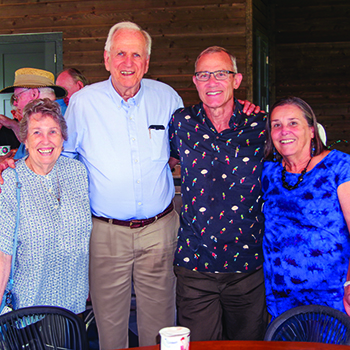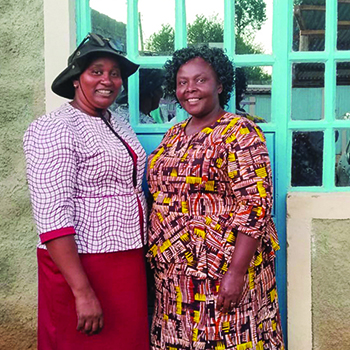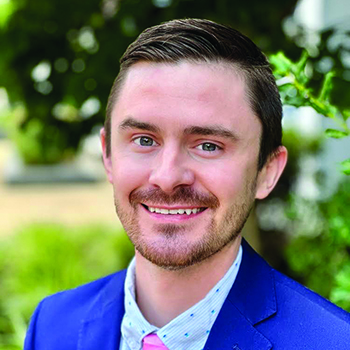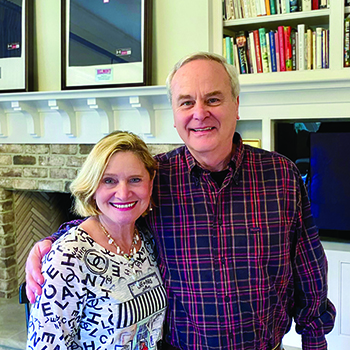Five years ago, when the request for help for a victim of sexual violence came from thousands of miles away, Luke Robbins ’11 knew he had to act.
“A survivor is a survivor, regardless of where they are,” Luke says.
He had recently started as director of counseling for the Rowan Center, a sexual assault resources agency based in Stamford, Connecticut. It provides free counseling and 24-hour advocacy services for sexual violence victims and survivors.
“We got a request on our website asking if anyone could provide remote services for a woman in Kenya,” recalls Luke, who currently serves as the center’s clinical director and works as a trauma therapist. “At the time, we were not aware of any sexual violence resources in that country.”
The agency was able to counsel the woman while Luke tapped into connections he made years earlier as a high schooler to find next-level care for her closer to home.
In the summer of 2005, Luke and other members of his Indianapolis hometown church, North United Methodist Church, traveled to Kenya to support the Academic Model Providing Access to Healthcare (AMPATH) Consortium.

Co-founded in 1989 by Dr. Bob Einterz ’77, professor emeritus at the Indiana University School of Medicine, AMPATH is a network of academic health centers that aims to foster long-term, equitable, and cross-cultural partnerships with host health centers and universities that serve populations with significant unmet needs.
“Dr. Joe and Sarah Ellen Mamlin, leaders in the AMPATH Kenya HIV care programs, were members of my church and wanted to take those interested in learning more about the operation to Kenya,” says Luke.
“(AMPATH) pioneered a different way of treating HIV/AIDS as a social and all-encompassing global condition rather than just a medical issue,” he continues. “(That trip) changed the course of my life. My time volunteering and playing with the kids on the children’s ward at Moi Teaching and Referral Hospital helped me see how much I took for granted in my own life.”
The trip inspired Luke to then spend two years in high school doing an independent research project on the social causes and indicators of the HIV/AIDS epidemic using Kenya as an example. Einterz volunteered to be his advisor for the project.
“Some of the kids were living with HIV or their parents were hospitalized with HIV,” Luke says. “Others were there because of other conditions. One child, Alvin, had been abandoned by his parents because Burkitt’s lymphoma had distorted the shape of his face, and they didn’t want him. It was the first time I was confronted with the reality that not all children have parents like mine, who make them feel loved every day. It was heartbreaking and eye-opening. I could show love to Alvin, and other children like him, by encouraging my community to continue supporting the work.”
Years later, luke knew he could reach out to Mamlin for guidance on how to best help the woman in Kenya who needed services. Mamlin put him in contact with Maggie and Grace.
“Maggie and Grace traveled five hours by bus to the town where this woman was,” Luke says. “They took good care of her and got her plugged into services.”

Maggie and Grace, who are Kenyans and former employees of AMPATH, were inspired by their work with AMPATH and wanted to find a way to address the gap they saw related to the needs of child victims of sexual violence. So they co-founded G-MARC, a safe house and crisis center in the Uasin Gishu county of Kenya. G-MARC is the only place of its kind in that region.
“They did this work for free, in their spare time, while working full-time elsewhere,” Luke explains. “I do the work I do in large part because of my experience visiting AMPATH and Moi Teaching and Referral Hospital in 2005. It is thanks to connections I made on that trip that I got connected with Maggie and Grace in the first place.”
Luke kept in close contact with the two women and learned more about the organization’s mission to provide counseling, community education, and advocacy services, with the hope of one day offering short-term safe housing for child victims of sexual violence.
“Working in mental health (in 2020 during COVID) was exhausting,” Luke says. “I would come home after a day of my own work and just want to unwind. But here were these two incredible women who spent their days working full-time, only to come home and spend their nights and weekends supporting child victims of sexual violence for free.”
Luke spent his nights and weekends for a year helping write policy documents, set up data systems, do trainings, and advising the women as best he could. He now serves as a volunteer consultant on the board and meets with them monthly to review and help them with whatever else they need, like writing and submitting grant applications.
“I remember one call with them in January 2021,” he continues. “It was dark on their end—probably 10 p.m. They were just smiling and so excited to be learning what I was teaching them. The fact that they could do all of this with a smile, genuinely happy to be of service to these kids, motivated me to do what I could to support them.”
Running a fully operational safe house takes time, effort, and money.
Through AMPATH, the two founders of G-MARC connected with a couple in Missouri who donated funds to help establish programming and purchase land to build the brick-and-mortar safe house. To cap their investment, in December 2021, the donors gifted six months’ worth of operating budget to the organization.

“Up to that point, Maggie and Grace were doing the counseling and community services as volunteers,” Luke says. “Many of the children they serve are witnesses in the criminal cases against their perpetrators. Families have been harassed, and there is concern that the children could be targeted by accused perpetrators as a means of disrupting the justice process.
“Once they received funding, they were able to open the safe house, hire a house mother and two armed guards, and start paying themselves a wage as well,” he continues.
Nearing the end of the initial six months of funding, Luke wanted to ensure the ongoing success of G-MARC. He gave his parents, Clay ’79 and Amy Robbins, a call, hoping they could provide some advice on how to help secure future funding for the safe house and crisis center.
“Because of my father’s work in philanthropy and my mother’s work helping deaf and hard-of-hearing children around the world, I thought it would be beneficial to consult them about where we should go and whom we should talk with to keep G-MARC operating,” says Luke.
Clay is the chair and CEO of Lilly Endowment Inc., one of the nation’s largest private philanthropic organizations. He has also served in leadership and board roles with the Central Indiana Corporate Partnership, United Way of Central Indiana, the Greater Indianapolis Chamber of Commerce, the Greater Indianapolis Progress Committee, and Damar Homes Inc. His years of philanthropic community contributions were recognized in the fall by Indiana Gov. Eric Holcomb, who awarded him the 2024 Sachem Award. The Sachem Award is Indiana’s highest honor and is presented to a civic leader who has demonstrated moral character and a commitment to service.
While simply looking for advice, Luke was not surprised when after careful consideration Clay and Amy decided they would fund G-MARC themselves.
“They were so moved by the dedication and drive of Maggie and Grace, and the importance of the work the women desperately wanted to do, that they made the decision to provide funding for the operating costs for a year,” Luke says.

“My wife and I have supported AMPATH financially for several years, but we decided there was a real need to also support these women (G-MARC founders),” says Clay. “They are like saints on earth. The work they are doing is just incredible.”
Thanks to continued funding from the Robbinses and others, since the safe house opened its doors in 2022, the staff of five has been able to continue counseling and advocacy work while the safe house has provided refuge to more than 200 children ranging in age from one to 17.
Despite their own contributions, Clay and Amy have always been quick to credit and show gratitude toward anyone else, including their son, before themselves.
“We encouraged them to make a difference in the world in whatever way fit them with the abilities and resources they have,” Clay says about what he and Amy tried to teach their three sons, Luke, Campbell ’09, and Peter ’12, growing up. “All three of the boys have been involved with different kinds of service projects since they were young. ... It has helped them understand different parts of the world and the challenges and strengths that people of other backgrounds and cultures have.
“Luke saw there was some value he might be able to add, and he knew he had connections to the Mamlins and Einterz, so it could all come together,” says Clay. “It’s all these relationships and community that get built over the years that could be activated in a way that is quite impactful.”